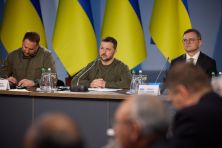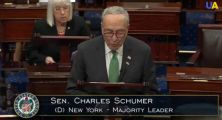More than 71,000 war crimes committed by Russian army soldiers during the full-scale invasion were recorded in Ukraine. This was announced by the head of the Department for Combating Crimes in the Conditions of Armed Conflict of the Office of the Prosecutor General of Ukraine Yuriy Belousov during a press conference “International Military Tribunal: what has changed in a year?”, FREEDOM reports.
Ukraine has collected hundreds of dossiers on Russians suspected of war crimes. From ordinary Russian soldiers to Russian Defense Minister Sergei Shoigu and President Vladimir Putin.
“We started mapping Russian commanders and generals last year. And we continue to update it week after week,” said Oleksandr Filchakov, head of the Kharkiv Regional Prosecutor’s Office, in a comment to The Guardian.
One of the suspects is Colonel-General of the Russian army Mikhail Mizintsev. He led a three-month siege of Mariupol, where the Russians killed at least 22,000 people, according to Ukrainian authorities. The destruction of the city in the Donetsk region is compared with the siege of Aleppo in Syria. It also fell into ruins after Russian bombardments. It was the “Mariupol massacre” Mizintsev who commanded the raids on Aleppo.
In Kharkiv, in Northern Saltivka, 70% of the residential area was destroyed by Russian troops. They fired, including with RBC-500 cluster bombs and Smerch cluster rockets, which are banned in most countries of the world, but not in Russia. The Center for Information Sustainability established where they were released from, and who is responsible for this – Colonel General Alexander Zhuravlev. By the way, he helped Mizintsev during the bombing of Aleppo in 2016.
The list of Russian war criminals also includes 40-year-old Azatbek Omurbekov. He led Russian troops in Bucha who killed, raped and tortured unarmed civilians. For this, Omurbekov received the nickname “the butcher of Buchi.”
In total, there are already more than 600 names and photos of the authors of the Ukrainian genocide on the diagram.
“There are names and photographs: many of those whom Ukraine suspects of possible involvement in war crimes. The map shows hundreds of Russian soldiers divided into regiments, all the way down to Supreme Commander Vladimir Putin. The board, 4 meters wide and 1.5 meters long, contains a detailed diagram of the entire Russian military chain of command in Ukraine.
Information on war criminals must be collected in order to bring them to justice. The first two proceedings on the abduction of Ukrainian children and attacks on the infrastructure of Ukraine are preparing to open the International Criminal Court. But the catch, lawyers say, is that the court cannot hear cases in absentia, and Russia is unlikely to extradite its officials.
“According to the overt and unspoken rules of international law, the President, the Prime Minister and the Minister of Foreign Affairs have legal immunity. That is, as long as they are in power, criminal cases cannot be initiated against them, they cannot be held criminally liable. Regarding the trial… We must understand that these trials will drag on for years and years. Not all of our applications will be satisfied,” comments Taras Zagorodny, managing partner of the National Anti-Crisis Group.
To put the Russian military-political leadership on trial, a new mechanism is needed – a special tribunal for the crime of aggression. 32 states have already taken the initiative.
“Now there are tools to prosecute war crimes, crimes of genocide, but there is no tool to prosecute the highest representatives of the military and political leadership of the Russian Federation for organizing all this and planning it all. It is for aggression that we can attract them, which does not exclude the involvement of the same Putin and other leaders of the Russian Federation both for the crime of genocide later, and for war crimes. Like, it goes without saying, but they need to be punished for planning and organizing the invasion of Ukraine,” Belousov explained.
What will be the format of the tribunal is still an open question. The final decision must be made at the session of the UN General Assembly. Ukrainian diplomats expect that they can vote for the format of the tribunal and determine its powers as early as April.
“We have now left for New York a fairly large exhibition dedicated to war crimes, to which we will invite ambassadors to the UN to explain to them what Russia is doing in our country, and to explain that those who started this aggression. We’re all pretty tight. I think that the end of this year and the beginning of the next, we can already expect the creation, ”said Oleg Gavrish, a member of the Ukrainian working group on the creation of a special tribunal.
This summer, the International Center for the Investigation of the Crime of Aggression will open in The Hague. The new body will prepare materials that will later become an accusatory base at a special tribunal so that all those who gave criminal orders and organized the genocide of the Ukrainian people are held accountable.













